By Julie Steinberg for Wall Street Journal
Many companies can point to a woman high enough on the food chain to show naysayers that anyone can make it up the ranks of power. Facebook has Sheryl Sandberg, Google has Marissa Mayer, J.P. Morgan has Mary Callahan Erdoes.
These women, however, are few and far between. Women held just 14.1% of executive officer positions in 2011 at Fortune 500 companies, down from 14.4% in 2010, according to recent research conducted by Catalyst, a nonprofit organization that seeks to advance women in business. When it comes to boards, women held 16.1% of seats in 2011, compared to 15.7% in 2010.
Why are the numbers so low? Despite their talent, education and hard work, many women simply aren’t chosen for roles that lead to greater success later. Women often don’t have the “intangible skills” needed to gain the attention of higher-ups at the company, says Elena Rand Kaspi, a former consultant to law firm White & Case and the president of LawScope Coaching, an executive career coaching company.
Getting “chosen,” then, is an art that many women need to learn. FINS spoke with women executives and leadership coaches to determine the best ways you can position yourself for the next great position.
Watch FINS reporter Julie Steinberg talk about the rules women need to follow to help them earn more management roles in the workplace on WSJ.com’s Mean Street.
Work hard
Doing excellent work is a baseline. If you don’t produce outstanding results, you won’t attract the notice of bigwigs at the firm who can propel your career forward. Hard work also entails knowing which skills you need to develop to get to where you want to be.
“Many people want to jump levels and get to the top by their gut feel, but what you don’t know can really create a minefield for you,” says Karen Peetz, vice chairman at BNY Mellon and one of three women on the executive committee. “Things like driving a strategy, managing staff, understanding financials are often learned more at the micro level before you get to the macro. You need that experience before leaping ahead.”
Before she arrived at BNY Mellon, Peetz, 56, had experience in sales and cash management, but in order to rise, she needed profit and loss experience. Once she managed people in a P&L business line, she was able to make her next move. Today she’s in charge of 17,000 people at BNY Mellon.
“You’re only as good as your last trade,” said Erin Duffy, 34, a former vice president at Merrill Lynch and the author of “Bond Girl,” a novel that chronicles one woman’s sales career on Wall Street. “If you’re not doing well, even if you’re hanging out every night with the managing directors, they’re not going to promote you. It’s very democratic in that way.”
Do work no one else wants to do
Stepping up when no one else is will is a great way to get noticed. In 2001, Donna Milrod was a recently-minted managing director at Deutsche Bank when she offered to take on a project no one else wanted. Her task was to devise a strategy for handling internal regulatory issues stemming from the firm’s acquisition of Bankers Trust.
“I took a risk early on to volunteer for this really horrible assignment that was really critical,” she said. “I felt that I had the skills, even though I was relatively junior.”
Succeeding in the assignment gained her exposure to the board and to senior management. As a result, she was offered a permanent post overseeing regulatory issues, and eventually given responsibility for corporate governance and client strategy for the Americas, two other management areas. Succeeding in those positions ultimately landed her the title of deputy chief executive of Deutsche Bank Americas, which she holds today.
Cultivate the people in charge
Figuring out who has the most powerful voice in the room is the first key to your success. The second is devising strategies to attract their interest in your career.
Mentors are important for giving you guidance on your career. Sponsors are more critical because they’re the ones banging on the table to bring you on for a new job or assignment.
Accordingly, you must treat them differently. Rosalie Mandel, a principal at accounting firm Rothstein Kass, recommends telling your mentor the good, the bad and the ugly and telling your sponsor only the good.
“The sponsor has heavy political capital and can place you into your next slot,” she said. “The mentor needs to know everything about you so they can help you grow and guide you.”
When Kelly Hoey, a former lawyer at White & Case and the founder of Women Innovate Mobile, an accelerator for tech companies with women founders focused on mobile applications, wanted to get people to notice her, she bent her schedule around theirs.
While at a law firm in Toronto, Hoey, now 46, knew that to get time with a certain partner, she had to do it on his schedule. Before noon, he would give her “all the time in the world.” After noon, he was focused on his own work. She scheduled morning meetings with him.
Similarly, Hoey, said she routinely shows up to meetings five minutes before they start so as to have extra time with the bigwigs in the room. She’ll also sit closer to them in the meeting itself and stay a few minutes after to chat with them.
It can be difficult to get one-on-one time with a male mentor or sponsor at some firms where sexual harassment training has made casual interaction like drinks after work a no-go. You need to find other time to bond, Hoey said. “If they send you an email and they’re in their office, take the opportunity to meet with them in person. Drop off research you’ve done in person. Find opportunities to get in front of them.”
Know what you want and go for it
Being clear about your goals is paramount. Veronika Sonsev was the first woman in AOL’s business affairs department, which handled the company’s mergers and acquisitions as well as corporate transactions through ad sales, when she joined in 1998.
Now 37, she’s had experience starting her own companies and is the founder of Women in Wireless, a nonprofit that promotes female leaders in mobile and digital media.
“In the summer of 2010, before I quit my job, I would go around telling everyone I was an entrepreneur and that I was starting my own company,” she said. “Once I called myself an entrepreneur, I was thought of as one.”
Women who get to the top understand that no one else can do it for them. Sheila Ronning, the Founder and CEO of Women in the Boardroom, which helps place women on corporate boards, recalls the distress of one woman who had lost her board seat on a bank in Chicago due to a merger and hadn’t looked for a seat on another.
“The woman said, ‘I just thought boards would find me,'” Ronning recalled.
Ronning is still working with the former director to revamp her board resume. “Women directors want to help other women, but only if you let them know you’re looking,” Ronning said. “She should have been reaching out to people while she was on that board to look at other seats that may have interested her.”
Promote yourself legitimately
You can be doing great work, but if no one knows about it, you might as well be invisible.
Deborah Buresh Jackson worked at Goldman Sachs in the 1980s in healthcare investment banking, a group that was just starting to get hot. Her first week, she was assigned to work on a $95 million transaction that involved raising money for the expansion of a hospital in Memphis, Tenn.
“When you’re on the road, it’s really hard for senior management back in the office to know what you’ve done. I learned early on to tell the senior people how exactly I had contributed to the deal,” she said.
Her team discovered the hospital couldn’t borrow as much as it wanted. She told the bank’s three partners, and as they learned of her interactions with the clients, they felt comfortable assigning her to more projects and allowing her to develop her own clients. She was promoted to vice president from associate and remained at Goldman for a decade before starting her own boutique investment banking firm.
Another former Goldmanite, Jacki Zehner, 47, was both the first woman trader to be made partner and the youngest woman to be made partner at the firm at age 32 in 1996. Zehner routinely volunteered for assignments that gained her visibility at the top. For example, she put up her hand whenever the firm needed someone to make a speech to incoming analysts or recruit at college campuses, she said.
“Those things really mattered at Goldman,” Zehner said. Ultimately, she served on the firm’s compliance control committee, leadership development committee, multiple task forces and also co-founded a women’s initiative in the fixed income group.
Network with your peers
Many women make the mistake of seeking sponsorship from only the people above them. Some of the people you work with are going to be in charge and could help you rise in the ranks.
“It’s connections with people your own age that will help you get promotions,” said Amy Siskind, a former head of distressed debt trading at Morgan Stanley and the co-founder of The New Agenda, an organization dedicated to advancing women into leadership roles. Siskind, 46, was the first woman managing director at Wasserstein Perella because a friend she had worked with in her mid-20s had landed there and pushed for her hire.
“I had older people help me,” Siskind said. “But most of it was with people my own age. People you work with will eventually become your clients, too, and if they can advocate for you, that’s just an important as an older person at the firm.”
Make your own career
If a position you want doesn’t exist, create it. Similarly, if you don’t have the mentors and sponsors helping you get to the next opportunity, get there yourself.
Carolyn Buck Luce, 59, learned this firsthand when she joined Ernst & Young as a partner in the corporate finance and restructuring group in 1991. “Most women had grown up there and I wasn’t well-known,” she said. “I didn’t have large networks that would have normally helped me progress.”
So she volunteered to run the firm’s e-commerce strategy, which would guide the firm’s investments in certain e-commerce companies. From there, Buck Luce was asked to become the national director of strategic investments, a new position, and lead E&Y’s investments into other companies such as IT security and smaller tech-related operations. Her track record in those assignments, coupled with her previous experience in banking, made her the natural choice to become the global pharmaceutical leader.
“The common theme is being willing to take a risk and understand the strategic direction of the company,” she advises.
Leave to get ahead
Sometimes you can fast track your career by walking out the door.
Casey Stavropoulos, 35, joined APCO Worldwide as a manager of crisis communications in December 2004, then left last November to become vice president of strategy and marketing at Tula Foods, a Chicago-based consumer goods company. She believes it would have taken her 15 years to move up the corporate ladder. Now, she’s one of three principals at the start-up foods company.
“It’s definitely stepping outside the box, but there’s something about paving your own way,” she said.
Dress well and play golf
The old adage “dress for success” still holds true. “Men of a certain caliber have bespoke suits. Women tend not to be as conscious that dress is part of their professional brand,” says Rand Kaspi of LawScope Coaching. You don’t need a bespoke suit, but you do need to avoid walking around in flats and khakis with a sweater set.
Once you dress the part, act the part with both clients and superiors. Whether that means studying up on squash because a client is a devotee or brushing up on vintage wines because a vice president once expressed his penchant for them, you’ll need to delve into hobbies you may not have considered.
If all this talk of hobbies is making you think of the one sport through which deals are made, you are correct: You need to learn how to play golf. You don’t have to be good, but you have to be competent enough to be invited for quality bonding time.
Pippa Woods, former manager of strategic planning at New Jersey Transit, used her ability to play to get closer to her bosses when she was starting out in her career. As a research officer for a transit agency in Vancouver, Canada, Woods, now 56, frequently took to the golf course with the three senior men at the company.
“My boss was a big golfer so we played a lot,” she said. “My mother gave me golf lessons when I was 16. I thought it was the worst 16th birthday present ever. But it was one of the best things she ever did. I didn’t play that well, but it was an opportunity to be on a level playing field.”
That bonding over golf gave her the confidence to ask for time off to enroll in masters degree courses in public administration. Her golf buddy bosses not only encouraged her, they didn’t dock her vacation pay to take them.
“I felt more equal on the golf course than in the workplace,” she says. “They could see me as a 360-degree person.”
The article was republished with permission. Read the original article from Wall Street Journal here.
The opinions and experiences expressed by the author or subjects do not necessarily reflect those of Women in the Boardroom.






